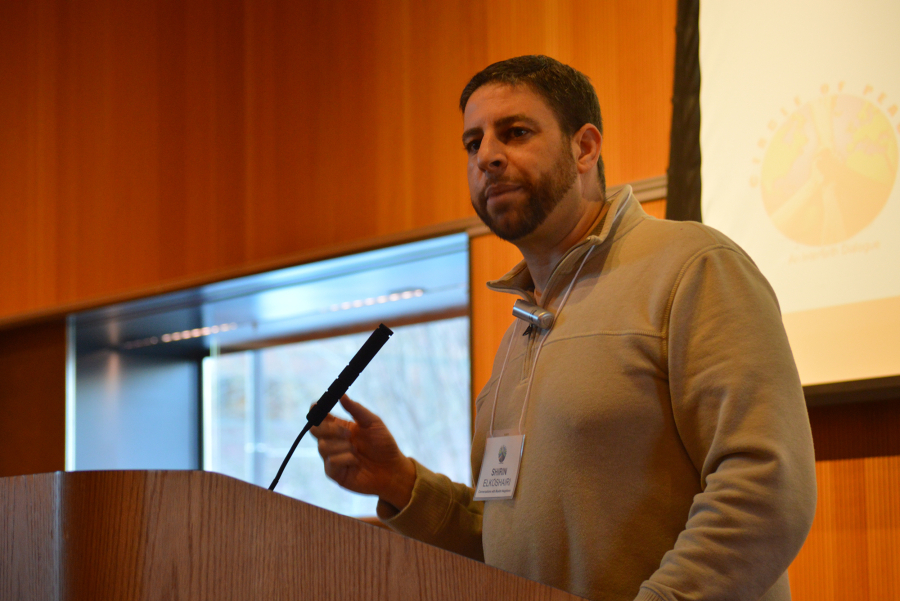Everyday Muslims have been saddled with a lot of strange questions as the profile of radical Islamist terror groups grows, Shirin Elkoshairi said, recalling growing up with Egyptian parents, Americans who happen to be Muslim.
For the longest time, he said, that he and his family are Muslim mattered little to others.
Elkoshairi, a practicing Sunni Muslim and member of the Circle of Peace interfaith organization, jokingly compared it to dealing with the antics of that drunken, black sheep uncle.
Except that uncle is on TV all the time, for the worst reasons, and doesn’t speak English.
“We have our drunk uncles, and that’s exactly who we’re going to talk about today,” he said.
The Circle of Peace group put on the event, called Conversations with Muslims, to chip away at misconceptions about the religion.
Elkoshairi and other Muslim speakers joined a full crowd at the Vancouver Library Sunday afternoon, in a three-hour presentation and dialogue that ranged from the history of early Islam, to late 20th century geopolitics, to where that 72-virgins-greeting-martyrs-in-heaven concept comes from.
Khalid Khan, an engineering professor, explained there are roughly 2.3 billion Christians and roughly 1.8 billion Muslims in the world.
“If you put all the Christians and Muslims together that’s more than half the population of the planet. Doesn’t it make sense that you start talking to each other?” he said. “There’s so much commonality between faiths, rather than differences, that we need to talk about.”
Misinterpretations
That latter concept, the notion of a promised bevy of virgins greeting martyred holy warriors entering the afterlife, came as a question from the audience, and, Elkoshairi said, it gets at the crux of what’s happening with radicalization and terrorism in the global Muslim community.
Among the other snake-oil ideas radical and violent Islamist groups peddle, he said, is the idea those engaging in jihad will get some kind of prize after death.
Beyond the surface-level mistranslation of “chaste” or “virtuous” to “virgin” is the deeper perversion of the concept of jihad, which Western ears, and impressionable terror recruits, have been conditioned to think means holy war.
Jihad roughly translates to struggle, or striving, said Arif Humayun, another of the afternoon’s speakers.
There is an element of defensive violence within the concept of jihad, he said, but it’s the “lesser” jihad, and in the original texts of Islam more often refers to defense against all religious persecution.
The core of it, he said, is the struggle for a kind of spiritual self-actualization through good works, not the pursuit of glory or worldly rewards.
“These guys can say things to suit their goals without any reference to the fundamentals, and it’s for us to stand up against them and tell people,” Humayun said. “I think its incumbent upon all of us to research these things, understand them and refute them. … That’s all the jihad. It’s to struggle to get the truth out.”
Where this radical misinterpretation of Islam comes from is complicated. Humayun and Khan described centuries of change, from shifting fortunes for the great Muslim civilizations of the Middle Ages and into the Renaissance, the breakup of the Ottoman Empire at the end of World War I, and the rise of Western imperialism and colonialism in developing nations and Muslim countries.
“This is the time when the radical ideologies’ seeds were first sown, and that is after the First World War,” Humayun said.
New, more radical, less inclusive interpretations arose, he said, some that tweaked Islamic teachings toward political ends and away from core values such as charity, unity and humility.
“What happened with this is this is the time politically inspired misinterpretations were developed. This is when they were implemented as state policy,” he said.
He compared the process to an assembly line. Radical schools, often funded through Saudi oil money, spread fringe ideas. Those students fall in with even more radical peers, and the process continues, creating the hard core radicals.
Radicals also mine U.S. foreign policy for rhetorical fodder. Elkoshairi pointed to the ongoing military interventions in Iraq, Afghanistan and other Muslim countries, and other missteps.
“When you bomb a country, remove its leadership, I think the most dangerous part of it is not the bombing, it’s the vacuum you create. When you have no government there, it is going to be the most vile person who steps in,” he said, referring to when he lived in Egypt and watched what happened after Hosni Mubarak was ousted following 30 years of rule.
Finally, Elkoshairi said, many young people in predominately Muslim countries don’t have much hope for decent work, or means to start a family and build a future.
Radical Islamism, they said, is a political project, not a religious one.
“We have made this into a business, and it has become a political ideology and people earn money for this, they get prestige and a following and all of this stuff,” Humayun said.
Muslims regularly denounce radical violence and dress down radical bastardizations of their religion, Elkoshairi said, but they haven’t always had the best infrastructure to show it. Nor have they needed it.
He talked about his parents, who came to the United States in the ’70s. They weren’t going around being self-appointed representatives of their faith, he said. They were living their lives.
“They were like, ‘Hey, you know what, if someone wants to know about my religion, they can ask me, but I think the best way I can share my religion is to not be a problem in the society and to contribute,'” he said. “Since 2001, Muslims have really realized, man, we have to talk about this thing all the time, because if you don’t fill that vacuum … someone else will.”




